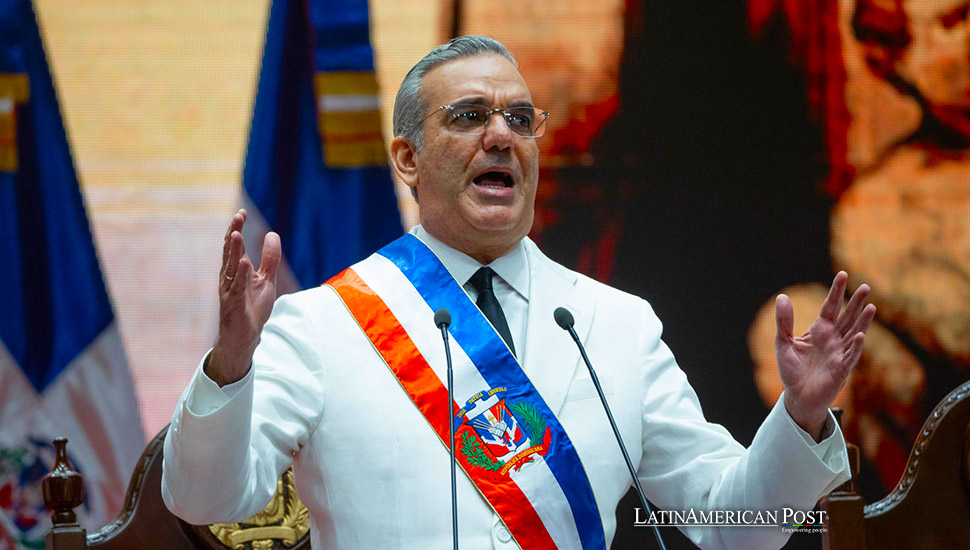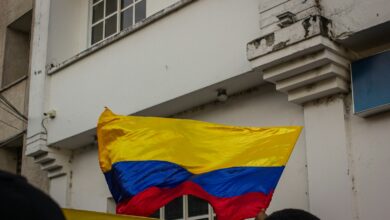Luis Abinader’s Economic Vision for Dominican Republic’s Prosperity

Dominican Republic President Luis Abinader embarks on his second term with ambitious economic goals. He aims to double the country’s GDP and secure long-term growth and stability by promoting private investment and reforming key sectors.
Luis Abinader, recently re-elected for a second four-year term as President of the Dominican Republic, is setting his sights on ambitious economic growth and structural reforms. With a strong pro-business platform, Abinader secured 58% of the vote, signaling widespread support for his economic vision. In his inaugural address, he emphasized the importance of promoting private investment as a cornerstone of his strategy to accelerate the country’s economic development. “There is no magical solution for success but we have a simple recipe to achieve it,” Abinader stated, highlighting his commitment to transparency and efficiency in public spending.
The Dominican Republic, the largest economy in the Caribbean, aims to double its $113-billion gross domestic product (GDP) by 2036. This ambitious target reflects Abinader’s confidence in the country’s economic potential, bolstered by his administration’s pro-business policies. The President’s focus on economic growth is not just about numbers; it’s about creating a stable and prosperous environment where the private sector can thrive, leading to job creation and improved living standards for the Dominican people.
Promoting Private Investment and Economic Growth
One of the key pillars of Abinader’s economic plan is the promotion of private investment. By fostering a business-friendly environment, his administration aims to attract both domestic and foreign investors to key sectors of the economy. The President’s previous experience as a businessman informs his approach, which prioritizes reducing bureaucratic hurdles, ensuring legal certainty, and offering incentives to investors.
The Dominican Republic’s strategic location, combined with its stable macroeconomic environment, makes it an attractive destination for investment. Under Abinader’s leadership, the country has seen an influx of foreign direct investment (FDI), particularly in the tourism, real estate, and manufacturing sectors. These investments are crucial for sustaining the country’s economic momentum and achieving the ambitious GDP growth target.
However, Abinader’s pro-investment stance is not without its challenges. The global economic environment remains uncertain, with inflationary pressures and geopolitical tensions affecting investor confidence. To mitigate these risks, the President has emphasized the need for sound fiscal policies and the strengthening of institutions that can support long-term economic stability.
Abinader’s administration is also focusing on modernizing the country’s infrastructure to support economic growth. Investments in transportation, energy, and digital infrastructure are seen as critical for enhancing the country’s competitiveness and attracting more investment. By improving the infrastructure, the Dominican Republic aims to reduce logistical costs and increase its appeal as a regional hub for trade and commerce.
Reforms to Drive Social and Economic Transformation
While economic growth is a priority, Abinader has also committed to a series of social reforms that he believes are essential for the country’s long-term prosperity. These reforms are aimed at improving labor rights, social protection, and the overall quality of life for Dominican citizens. By addressing social inequalities and ensuring that the benefits of economic growth are widely shared, Abinader hopes to build a more inclusive economy.
One of the key areas of reform is labor rights. Abinader has pledged to present new legislation to the Dominican Congress that would enhance workers’ rights, ensure fair wages, and improve working conditions. These reforms are designed to create a more equitable labor market, which is crucial for maintaining social stability and fostering a productive workforce.
In addition to labor reforms, Abinader is also focusing on social protection programs. His administration aims to expand access to healthcare, education, and social services, particularly in rural and underserved areas. By strengthening the social safety net, Abinader hopes to reduce poverty and inequality, which remain significant challenges in the Dominican Republic.
Another important aspect of Abinader’s reform agenda is strengthening the independence of the electoral body and preventing future presidents from exceeding the two-term limit defined in the constitution. By promoting transparency and accountability, these reforms are intended to enhance democratic governance and ensure that political power is not concentrated in the hands of a few individuals.
Abinader’s Modern Revolutionary Party, which holds a strong majority in both the upper and lower houses of Congress, is well-positioned to pass these reforms. However, the President will need to navigate the complexities of the legislative process and address potential opposition from interest groups that may be resistant to change.
Economic Diversification and Global Integration
As part of his economic strategy, Abinader is also focused on diversifying the Dominican Republic’s economy and deepening its integration into the global economy. The country has long relied on tourism as a major driver of economic growth, but the President recognizes the need to expand into other sectors to reduce vulnerability to external shocks.
One of the key areas of focus is the mining sector. The Dominican Republic is home to one of the world’s largest gold mines, Pueblo Viejo, and is a significant global supplier of ferronickel. Abinader’s appointment of economist Joel Santos as mines and energy minister signals the administration’s intention to maximize the potential of the mining sector while ensuring that it is developed in a sustainable and environmentally responsible manner.
In addition to mining, Abinader is looking to boost the manufacturing and agriculture sectors. By increasing productivity and enhancing value-added activities, the Dominican Republic aims to become a more competitive player in global supply chains. The government is also exploring opportunities in renewable energy, with the goal of reducing the country’s dependence on imported fossil fuels and enhancing energy security.
Trade is another critical component of Abinader’s economic plan. The Dominican Republic’s strategic location in the Caribbean makes it an ideal gateway for trade between Latin America, North America, and Europe. The President is keen to leverage this advantage by negotiating new trade agreements and strengthening existing partnerships. By expanding access to international markets, Abinader hopes to increase exports and attract more foreign investment.
However, global economic conditions present both opportunities and challenges for the Dominican Republic. The ongoing effects of the COVID-19 pandemic, coupled with rising inflation and supply chain disruptions, have created an uncertain economic environment. Abinader’s ability to navigate these challenges and capitalize on emerging opportunities will be critical for the success of his economic agenda.
Challenges and Opportunities
As Luis Abinader embarks on his second term as President of the Dominican Republic, the stakes are high. His ambitious economic agenda, focused on promoting private investment, implementing social reforms, and diversifying the economy, offers a roadmap for sustained growth and development. However, the road ahead is not without challenges.
One of the key challenges is managing the country’s fiscal position. While the Dominican Republic has maintained relatively low levels of public debt, the government will need to ensure that its spending plans are sustainable. This will require careful management of public finances and a commitment to fiscal discipline.
Another challenge is maintaining social cohesion in the face of rapid economic change. As the economy grows and modernizes, there is a risk that certain segments of the population could be left behind. Abinader’s social reforms are designed to mitigate this risk, but their success will depend on effective implementation and the ability to address the needs of vulnerable communities.
Security is also a major concern, particularly in light of the ongoing conflict in neighboring Haiti. The Dominican Republic has deported hundreds of thousands of migrants from Haiti and bolstered its border security in response to the crisis. While Abinader has called for the international community to intervene in Haiti, he has made it clear that the Dominican Republic will not take on the burden alone. Balancing the need for security with humanitarian considerations will be a delicate task for the President in the coming years.
Despite these challenges, there are also significant opportunities for the Dominican Republic under Abinader’s leadership. The country’s strategic location, stable macroeconomic environment, and growing reputation as an investment destination position it well for future growth. By continuing to promote private investment, diversify the economy, and implement social reforms, Abinader has the potential to transform the Dominican Republic into a more prosperous and equitable society.
Also read: Digital Wallets Transform Financial Inclusion Across Latin America
As Abinader moves forward with his economic agenda, the international community will be watching closely. The success of his policies could serve as a model for other countries in the region, demonstrating the potential of a pro-business, reform-oriented approach to governance. For the Dominican Republic, the next four years will be a critical period of transformation, with the potential to shape the country’s economic future for decades to come.





